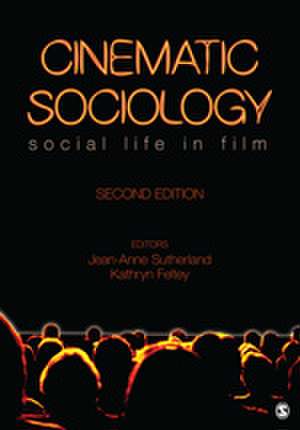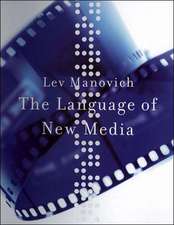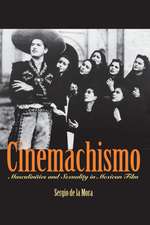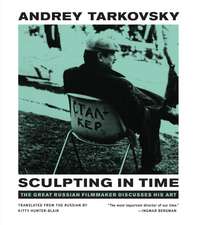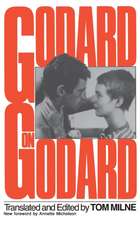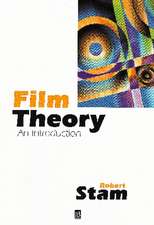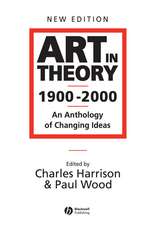Cinematic Sociology: Social Life in Film
Editat de Jean-Anne Sutherland, Kathryn M. Felteyen Limba Engleză Paperback – 28 mai 2012
Preț: 520.63 lei
Preț vechi: 703.56 lei
-26% Nou
Puncte Express: 781
Preț estimativ în valută:
99.63€ • 103.34$ • 83.07£
99.63€ • 103.34$ • 83.07£
Carte disponibilă
Livrare economică 06-20 martie
Livrare express 19-25 februarie pentru 39.23 lei
Preluare comenzi: 021 569.72.76
Specificații
ISBN-13: 9781412992848
ISBN-10: 1412992842
Pagini: 496
Ilustrații: Illustrations
Dimensiuni: 178 x 254 x 23 mm
Greutate: 0.78 kg
Ediția:Second Edition
Editura: SAGE Publications
Colecția Sage Publications, Inc
Locul publicării:Thousand Oaks, United States
ISBN-10: 1412992842
Pagini: 496
Ilustrații: Illustrations
Dimensiuni: 178 x 254 x 23 mm
Greutate: 0.78 kg
Ediția:Second Edition
Editura: SAGE Publications
Colecția Sage Publications, Inc
Locul publicării:Thousand Oaks, United States
Cuprins
Chapter 1: Introduction - Jean-Anne Sutherland and Kathryn Feltey
Chapter 2: Theory
Sitting in the Dark with Max: Classical Sociological Theory Through Film - Michael Kimmel
Decoding Modern Society: The Matrix Trilogy and the Realm of Alienation - Harry Dahms
Outtake: Lights, Camera, Theory: Picturing Hollywood through Multiple Sociological Lenses - Mark Rubinfeld
Chapter 3: Social Class
Understanding Social Mobility through the Movies - James J. Dowd
Class in the Classroom: Hollywood’s Distorted View of Inequality - Robert Bulman
Outtake: Social Class in America and People Like Us - Kathy Feltey
Chapter 4: Race & Ethnicity
The Spectacle of Black Violence as Cinema - Ed Guerrero
Don't Worry, We are all Racists!: Crash and the Politics of Privatization - Henry A. Giroux and Susan Searls Giroux
Latinos/as Through the Lens - Carleen R. Basler
Outtake: Pocahontas and Intersectionality: A Sociologist Reflects - Teresa Martinez
Chapter 5: Gender & Sexuality
The Masculinity of the Governator: Muscle and Compassion in American Politics - Michael Messner
Constructing Empowered Women: Cinematic Images of Power, and Powerful Women - Jean-Anne Sutherland
Boundary Work: Bisexuality and Transgender on Film - Betsy Lucal and Andrea Miller
Outtake: Geena Davis Institute on Gender in Media - Jean-Anne Sutherland
Chapter 6: Public & Private Social Worlds
Service, Smiles and Selves: Representations of Labor and the Sociology of Work - Karla Erickson
Reel Families: Family Life in Popular Film - Janet Cosbey
Outtake: Seeing the Emotional Dimensions of Work and Family Life - Rebecca Erickson
Chapter 7: Deviance, Crime & Law
The Caped Crusader: What Batman Films Tell Us About Crime & Deviance - Robert Wonser and David Boyns
Crime, Film and Criminology - Nicole Rafter
The Hero, the Law, and the People in Between: Models of the Legal System in Hollywood Films - Valerie Callanan
Outtake: Corporate Crime and The Informant! - Mike Maume
Chapter 8: Life Course: Childhood, Adulthood & Old Age
"Look Out New World, Here We Come”? Race, Racialization, and Sexuality in Four Children’s Animated Films by Disney, Pixar, and DreamWorks - Carmen R. Lugo-Lugo and Mary K. Bloodsworth-Lugo
First comes the Baby Carriage?: Non-Normative Transitions to Parenthood in Film - Jeanne Holcomb
Battles & Balloons: Old Manhood in Film - Neal King
Outtake: Growth of the Nonlinear Life Trajectory - Erica Orange
Chapter 9: Social Institutions – Religion, Sports, Medical and War
Seeing Religion Sociologically Through Film - Sue Monahan
Sport as Social Institution: Football Films and the American Dream - Jeff Montez de Oca
In Sickness and In Health: Medical Sociology through Celluloid Stories - Bernice Pescosolido and Kathleen Oberlin
The 1991 Iraq Invasion in Cinematic Perspective: Jarhead and Three Kings - Elizabeth E. Martinez
Outtake: Zombies Apocalypse: Understanding the Perceptions of Health vs. Non-Health - Andrew Hund
Chapter 10: Global Connections
Dirty Pretty Things: The State, Global Migration and Survival in Contemporary Cities - Roberto G. Gonzales
Slumdog or Millionaire—May I phone a Friend?: Neoliberalism and Globalizing the American Dream - Alison Moss and Jerome Hendricks
Outtakes: Arabs in Film - Jack Shaheen
Chapter 11: Social Change – Technology, Collective Behavior & Social Movements
From Earth to Cosmos: Environmental Sociology and Images of the Future in Science Fiction Film - Christopher Podeschi
The Only Possible Solution?: The Challenge of Nonviolence to the Hegemony of Violence in Film - Kathryn Feltey
’We Will No Longer Sit Quietly:’ Social Movements through Film - Jeffrey A. Langstraat
Outtakes: Thoughts on Activist Movies (Excerpt) - John Farr
Chapter 2: Theory
Sitting in the Dark with Max: Classical Sociological Theory Through Film - Michael Kimmel
Decoding Modern Society: The Matrix Trilogy and the Realm of Alienation - Harry Dahms
Outtake: Lights, Camera, Theory: Picturing Hollywood through Multiple Sociological Lenses - Mark Rubinfeld
Chapter 3: Social Class
Understanding Social Mobility through the Movies - James J. Dowd
Class in the Classroom: Hollywood’s Distorted View of Inequality - Robert Bulman
Outtake: Social Class in America and People Like Us - Kathy Feltey
Chapter 4: Race & Ethnicity
The Spectacle of Black Violence as Cinema - Ed Guerrero
Don't Worry, We are all Racists!: Crash and the Politics of Privatization - Henry A. Giroux and Susan Searls Giroux
Latinos/as Through the Lens - Carleen R. Basler
Outtake: Pocahontas and Intersectionality: A Sociologist Reflects - Teresa Martinez
Chapter 5: Gender & Sexuality
The Masculinity of the Governator: Muscle and Compassion in American Politics - Michael Messner
Constructing Empowered Women: Cinematic Images of Power, and Powerful Women - Jean-Anne Sutherland
Boundary Work: Bisexuality and Transgender on Film - Betsy Lucal and Andrea Miller
Outtake: Geena Davis Institute on Gender in Media - Jean-Anne Sutherland
Chapter 6: Public & Private Social Worlds
Service, Smiles and Selves: Representations of Labor and the Sociology of Work - Karla Erickson
Reel Families: Family Life in Popular Film - Janet Cosbey
Outtake: Seeing the Emotional Dimensions of Work and Family Life - Rebecca Erickson
Chapter 7: Deviance, Crime & Law
The Caped Crusader: What Batman Films Tell Us About Crime & Deviance - Robert Wonser and David Boyns
Crime, Film and Criminology - Nicole Rafter
The Hero, the Law, and the People in Between: Models of the Legal System in Hollywood Films - Valerie Callanan
Outtake: Corporate Crime and The Informant! - Mike Maume
Chapter 8: Life Course: Childhood, Adulthood & Old Age
"Look Out New World, Here We Come”? Race, Racialization, and Sexuality in Four Children’s Animated Films by Disney, Pixar, and DreamWorks - Carmen R. Lugo-Lugo and Mary K. Bloodsworth-Lugo
First comes the Baby Carriage?: Non-Normative Transitions to Parenthood in Film - Jeanne Holcomb
Battles & Balloons: Old Manhood in Film - Neal King
Outtake: Growth of the Nonlinear Life Trajectory - Erica Orange
Chapter 9: Social Institutions – Religion, Sports, Medical and War
Seeing Religion Sociologically Through Film - Sue Monahan
Sport as Social Institution: Football Films and the American Dream - Jeff Montez de Oca
In Sickness and In Health: Medical Sociology through Celluloid Stories - Bernice Pescosolido and Kathleen Oberlin
The 1991 Iraq Invasion in Cinematic Perspective: Jarhead and Three Kings - Elizabeth E. Martinez
Outtake: Zombies Apocalypse: Understanding the Perceptions of Health vs. Non-Health - Andrew Hund
Chapter 10: Global Connections
Dirty Pretty Things: The State, Global Migration and Survival in Contemporary Cities - Roberto G. Gonzales
Slumdog or Millionaire—May I phone a Friend?: Neoliberalism and Globalizing the American Dream - Alison Moss and Jerome Hendricks
Outtakes: Arabs in Film - Jack Shaheen
Chapter 11: Social Change – Technology, Collective Behavior & Social Movements
From Earth to Cosmos: Environmental Sociology and Images of the Future in Science Fiction Film - Christopher Podeschi
The Only Possible Solution?: The Challenge of Nonviolence to the Hegemony of Violence in Film - Kathryn Feltey
’We Will No Longer Sit Quietly:’ Social Movements through Film - Jeffrey A. Langstraat
Outtakes: Thoughts on Activist Movies (Excerpt) - John Farr
Descriere
This one-of-a-kind text takes encourages students to develop critical thinking and analytical skills by 'seeing' films sociologically. Each essay uses one or more films to illustrate a key central topic such as social class, race and ethnicity, gender and so on.
